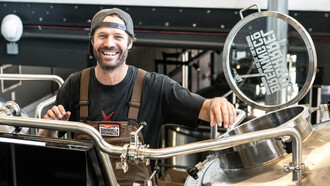Meat is prepared in many recipes and ways, the most famous of which is grilling on charcoal. In fact, the taste of meat grilled differs and may make the taste better, in addition to the pleasure of preparation and grilling it. But the usual and well-known method of grilling has many harms to health.
Grilling meat may expose you to cancer, it has been proven that cooking any type of meat at high temperatures through grilling produces cancer-causing chemicals.
Hetrocyclic amines (HCAs)
Hetrocyclic amines (HCAs) are formed when amino acids (the blocks for building proteins) react with sugars and creatinine at high temperatures resulting in the production of HCAs.
Any meat cooked at high temperatures, whether on a grill, in a skillet, or under the broiler, will contain HCAs, which are human carcinogens. The grilling is a component of the issue, but the heat is also a factor. A high-temperature pan-fry (over 150 °C) also raises the risk of cancer.
Except for meat cooked at high temperatures, HCAs are not present in food in considerable concentrations.
Polycyclic aromatic hydrocarbons (PAHs)
When meat is grilled directly over a heated surface or an open flame, the fat and liquids from the flesh drip onto the surface or fire, igniting it and producing smoke and flames. The polycyclic aromatic hydrocarbons (PAHs) in the smoke cause the meat's surface to stick. Other methods of food preparation, such as smoking meats, can also produce PAHs.
When meat liquids run onto coals or other heating surfaces and ignite in flames and smoke, PAHs are created. They only exist on grilled or smoked meat and stick to it.
Along with cigarette smoking and automobile exhaust gases, other smoked foods also contain PAHs.
Acrylamide
When food is cooked at a high temperature, a chemical compound called acrylamide develops. It is less apparent, however, what the connection is between ingesting it in food and developing cancer, even though it is known to be a possible carcinogen and hazardous in its industrial form.
Asparagine, a naturally occurring amino acid, reacts with a few (other naturally occurring) carbs to generate acrylamide. Food that hasn't been cooked or boiled doesn't contain acrylamide. Products made from milk, meat, or fish are far less likely to contain acrylamide. It doesn't matter if the food is "organic" or not; what matters is the sort of food. Smoking tobacco also leads to the formation of acrylamide.
Reducing Carcinogens
First, marinating the food for 20 minutes before grilling helps prevent the development of heterocyclic amines.
Second, lowering the temperature while cooking even if it takes longer to prepare food at lower temperatures.
Third, if it is possible to use a gas grill to avoid using lighter fluid when using a charcoal barbecue.
Fourth, control the flame before adding meat to the grill; making sure the fire has completely down.
Fifth, setting the grill rack higher, on a gas grill, and raising the grill rack out of the heat may be beneficial. When cooking meats on the grill, it is possible to utilize indirect cooking methods to keep the flames away from the food and use the grill as an oven.
Sixth, reducing the fat, before grilling, removing any extra fat to reduce the production of PAHs.
Lastly, pick the appropriate charcoal. Red meats don't seem to be particularly affected by the type of charcoal; however when salmon is cooked using coconut shell charcoal, much fewer HCAs and PAHs are produced than when salmon is grilled with wood charcoal.
(Article by Dr. Thiago Freire and Evan Sabih)
References
Grilling Meats and an Increased Cancer Risk.
Does Burned Food Really Give You Cancer?
Does burnt food give you cancer?
Chemicals in Meat Cooked at High Temperatures and Cancer Risk.















